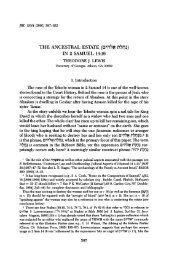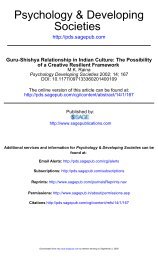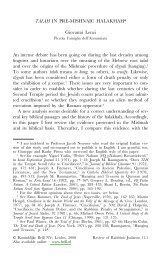Religion, Theology, and Philosophy on the Way to Being and Time ...
Religion, Theology, and Philosophy on the Way to Being and Time ...
Religion, Theology, and Philosophy on the Way to Being and Time ...
You also want an ePaper? Increase the reach of your titles
YUMPU automatically turns print PDFs into web optimized ePapers that Google loves.
I. M. Fehér / Research in Phenomenology 39 (2009) 99–131 121<br />
science. 63 His<strong>to</strong>ry—or ra<strong>the</strong>r, <strong>the</strong> his<strong>to</strong>rical world—became for Dil<strong>the</strong>y an<br />
object of science, something that in its embarrassing richness of types <str<strong>on</strong>g>and</str<strong>on</strong>g><br />
fi gures <strong>on</strong>e takes pleasure in c<strong>on</strong>templating. What mattered was no more his<strong>to</strong>rical<br />
being but his<strong>to</strong>rical knowledge <strong>to</strong>ge<strong>the</strong>r with its claim <strong>to</strong> objective<br />
validity, whereby <strong>the</strong> subject of that knowledge was a de-situated timeless<br />
observer ra<strong>the</strong>r than his<strong>to</strong>rically rooted <str<strong>on</strong>g>and</str<strong>on</strong>g> existentially involved fi nite existence.<br />
In summary, Heidegger works out his all important c<strong>on</strong>cept of “das<br />
His<strong>to</strong>rische” in his early lecture courses in sheer oppositi<strong>on</strong> <strong>to</strong> his<strong>to</strong>ricism, <strong>the</strong><br />
main critical suggesti<strong>on</strong> being that his<strong>to</strong>ricism strives for an “objective” knowledge<br />
of his<strong>to</strong>ry (an impossible aim), ra<strong>the</strong>r than for an au<strong>the</strong>ntic his<strong>to</strong>rical<br />
“being” of humans—<str<strong>on</strong>g>and</str<strong>on</strong>g> that <strong>the</strong> fi rst not so much promotes <strong>the</strong> sec<strong>on</strong>d but<br />
instead suppresses it. 64<br />
Against <strong>the</strong> background of this criticism Heidegger endeavors <strong>to</strong> reappropriate<br />
<strong>the</strong> <strong>on</strong><strong>to</strong>logical dimensi<strong>on</strong> of his<strong>to</strong>ricism <str<strong>on</strong>g>and</str<strong>on</strong>g> <strong>to</strong> gain access <strong>to</strong> his<strong>to</strong>ry in<br />
terms of his<strong>to</strong>rical being. Th ereby he does not fail <strong>to</strong> acknowledge his indebtedness<br />
<strong>to</strong> Dil<strong>the</strong>y <str<strong>on</strong>g>and</str<strong>on</strong>g> <strong>to</strong> claim, eventually, that his c<strong>on</strong>cepti<strong>on</strong> of his<strong>to</strong>ry grew<br />
out of an appropriati<strong>on</strong> of Dil<strong>the</strong>y’work. 65 In his postwar lecture courses, he<br />
notes frequently that by stressing <strong>the</strong> importance of his<strong>to</strong>ry, he has in mind<br />
his<strong>to</strong>ry primarily not as a matter of scholarship. To put it bluntly: our knowing<br />
relati<strong>on</strong> <strong>to</strong> his<strong>to</strong>ry is <strong>on</strong>ly a derivative <strong>on</strong>e, <strong>the</strong> primary relati<strong>on</strong> is <strong>on</strong>e of<br />
being—we are his<strong>to</strong>ry. Th e way we live his<strong>to</strong>ry, or are his<strong>to</strong>ry, is dependent<br />
up<strong>on</strong> how we live temporality. His<strong>to</strong>ry is primarily his<strong>to</strong>ricity, that is, Geschehen,<br />
of a specifi c being called Dasein—it is <strong>the</strong> movement of its erstrecktes<br />
Sicherstrecken, its stretching al<strong>on</strong>g between birth <str<strong>on</strong>g>and</str<strong>on</strong>g> death. 66 Th e way his<strong>to</strong>ry<br />
becomes object for scientifi c investigati<strong>on</strong> is decided from time <strong>to</strong> time by<br />
<strong>the</strong> primordial his<strong>to</strong>ricity of Dasein. Th is positi<strong>on</strong> is clearly anticipated in<br />
<strong>the</strong> early lecture courses. His<strong>to</strong>ry, Heidegger says, for example in 1919/20, is<br />
not critique of <strong>the</strong> sources but, ra<strong>the</strong>r, living al<strong>on</strong>g with life (mitlebendes<br />
63) See, for example, GA 17: 301 (Dil<strong>the</strong>y fell victim <strong>to</strong> <strong>the</strong> traditi<strong>on</strong>al questi<strong>on</strong>, how is his<strong>to</strong>ry<br />
of science as science possible?). See also, ibid., 302.<br />
64) Th e term “das His<strong>to</strong>rische” will be replaced in <strong>Being</strong> <str<strong>on</strong>g>and</str<strong>on</strong>g> <strong>Time</strong> by “das Geschichtliche,” or<br />
“Geschichtlichkeit.” For later, see <strong>the</strong> distincti<strong>on</strong> between “geschichtliche und his<strong>to</strong>rische Wahrheit”<br />
in GA 39: 144ff , viz., that between “his<strong>to</strong>rische Betrachtung” <str<strong>on</strong>g>and</str<strong>on</strong>g> “geschichtliche Besinnung” in<br />
GA 45: 34ff ., 49ff ., 88ff . Fur<strong>the</strong>r, see also GA 45: 11ff ., 40, 201; GA 65: 32f., 151f. 153 (“Die<br />
His<strong>to</strong>rie . . . ist ein ständiges Ausweichen vor der Geschichte”), 359, 421f., 493f.<br />
65) See SZ 397.<br />
66) See SZ 19f., 375, 374f. / BT 40f., 427, 425f. “[T]he locus of <strong>the</strong> problem of his<strong>to</strong>ry . . . is not<br />
<strong>to</strong> be sought in his<strong>to</strong>riology as <strong>the</strong> science of his<strong>to</strong>ry” (SZ 375 / BT 427).







